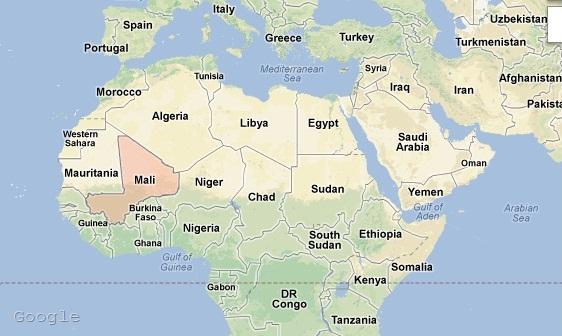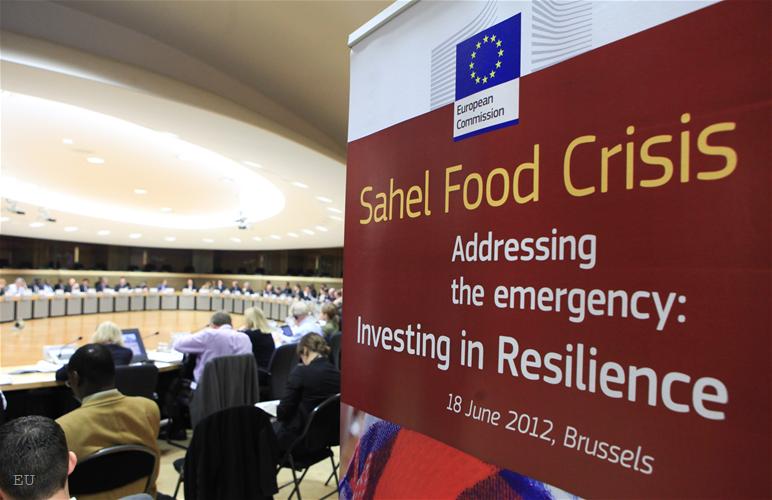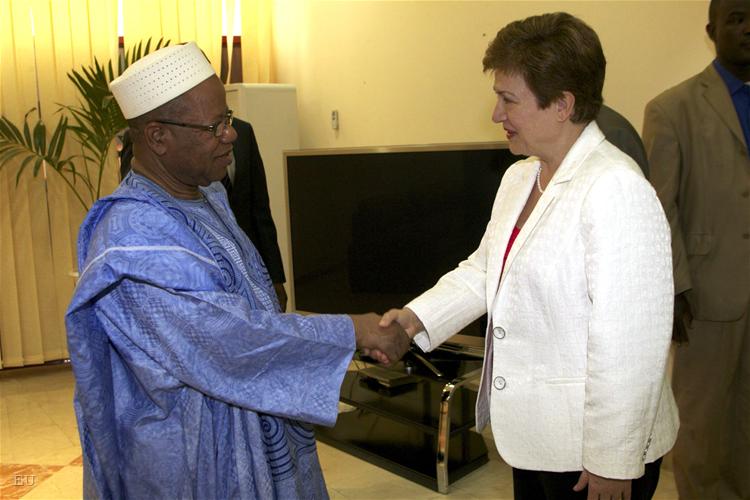Extremism on the Verge – the True Value of the EU Training Mission in Mali
Hannes Lenk, trainee, February 5, 2013
 After falling into the hands of Tuareg rebels and al-Qaeda linked Islamist extremists, concerns that northern Mali could turn into a bulwark of extremism are growing fast. The French responded quickly to the threat in the Sahel by deploying troops to support the Malian Armed Forces in combat. Since, all eyes are turned to the EU awaiting action to intervene and re-establish the territorial integrity in northern Mali. The possibility of an EU Training Mission (EUTM) in Mali, not unlike the one deployed in Somalia, was already discussed by the EU Foreign Affairs Council in mid-October last year. On January 17, the EU foreign ministers formally established the Mali EUTM.
After falling into the hands of Tuareg rebels and al-Qaeda linked Islamist extremists, concerns that northern Mali could turn into a bulwark of extremism are growing fast. The French responded quickly to the threat in the Sahel by deploying troops to support the Malian Armed Forces in combat. Since, all eyes are turned to the EU awaiting action to intervene and re-establish the territorial integrity in northern Mali. The possibility of an EU Training Mission (EUTM) in Mali, not unlike the one deployed in Somalia, was already discussed by the EU Foreign Affairs Council in mid-October last year. On January 17, the EU foreign ministers formally established the Mali EUTM.
The Mali Mission is one of many measures reflecting the EU involvement in the Sahel region that pre-dated the Islamist invasion in northern Mali, where ongoing fighting is simply worsening the food crisis and is deteriorating the humanitarian situation of the population of one of the world’s poorest countries. "The EU is committed to contributing actively to a peaceful and credible transition process in Mali and to long-lasting solutions to the security crisis in northern Mali […]", the Union claims in official documents. But aside from the humanitarian considerations, rising extremism poses a more concrete security threat to the EU itself. Increasing activities of terrorist-linked groups in northern Mali heightens the risk or terrorist attacks on EU territory and is likely to hamper the achievement of the EU's strategic aims. Therefore, strong EU response to the threats in Mali is becoming of utmost relevance for the EU foreign policy and appears to sit most adequately in the Common Security and Defence Policy (CSDP).
Is the EUTM Mali that powerful response?
In the wider context of the EU common security and defence policy (CSDP), the Mali crisis emphasises both the need for emancipation of the CSDP and provides an opportunity to show the reach, determination and commitment of the CSDP for crisis resolution in immediate neighbouring regions. The official mandate of the EUTM Mali is strictly limited to training and advising the Malian Armed Forces and excludes direct involvement in combat operations. It reflects the outcome of the Foreign Affairs Council in early October 2012. Apart from building military capacity, the Mission will support command and operations, logistics, HR, the promotion of international humanitarian law and protection of civilian and human rights.
The EUTM Mali does not, therefore, aim at providing a short-term solution to the current security threat, it rather lays out the groundwork for strong Malian Armed Forces that can respond timely, effectively and efficiently to security threats and protect the country's territorial integrity on the long run.
Up to 450 personnel for the first 15 months will be deployed by mid-February at the latest. Although a great majority of member states have already confirmed their support for the Mali mission, the response is not unlimited. Addressing the House of Commons British Prime Minster David Cameron described the Sahel region as becoming a "magnet for jihadists" and promised strong anti-terrorist and intelligence action as a response to the Algeria gas plant crisis. Yet, with regards to the EUTM Mali, he emphasised that the deployed personnel will be in the "tens, not hundreds". Germany has agreed to deploy 40 personnel and contribute with 15 million euros, but logistic difficulties might delay the deployment. The public appears to generally agree with the necessity the situation in northern Mali to be stabilised, but they are at unease to see national soldiers being deployed in an active combat zone.
Travelling to Mali for an initial assessment of the situation, Francois Lecointre, the French general leading the EUTM Mali, found the Malian troops badly trained, under-equipped and extremely demoralised by their persistent defeat by the rebels. He stressed that it might take longer than the initial 15-month mandate to rebuild true military capacity in the Malian armed forces. He said, "recent events have highlighted that what might have seemed at the start like a short-term training mission of the Malian army is really a fundamental, absolutely necessary action for an army which collapsed very quickly in the face of the Tuareg offensive".
Mali – the powder keg of an unstable Sahel region
In March 2011 the EU External Action Service adopted a Strategy for Security and Development in Sahel. It focuses on "political and economic governance, institutional capacity building, and regional integration". According to the Strategy, the ostensible security concerns about extremism and organised crime all across the Sahel are directly linked to the economic and socio-economic development of the region. The establishment of secure environment through closer regional cooperation is therefore considered paramount for economic growth and poverty reduction.
Among other things, the threat of growing violent extremism and terrorist-linked  security threats moving into northern Mali from neighbouring Maghreb are set out as a major challenge for the impoverished Sahel region. These threats not only hamper the provision of humanitarian and development aid in the region, but pose a direct security threat of terrorist activities on EU territory. Earlier in October last year, Hillary Clinton called Mali "a powder keg that the international community cannot afford to ignore". The reduction of terrorist attacks and criminal networks in the area becomes therefore a core objective for the Sahel Strategy.
security threats moving into northern Mali from neighbouring Maghreb are set out as a major challenge for the impoverished Sahel region. These threats not only hamper the provision of humanitarian and development aid in the region, but pose a direct security threat of terrorist activities on EU territory. Earlier in October last year, Hillary Clinton called Mali "a powder keg that the international community cannot afford to ignore". The reduction of terrorist attacks and criminal networks in the area becomes therefore a core objective for the Sahel Strategy.
The Strategy promotes a "regional, integrated and holistic" approach in which the EU Training Mission in Mali plays an intrinsic role. It is to bring stability and long-term solutions for a country in a severely aggravating crisis by restoring state authority and territorial integrity. Weaknesses in progress of achieving a secure environment in Mali have already been identified in the Sahel Strategy. Particular operational challenges include the lack of momentum for the Special Programme for peace, security and development in the north of Mali and the incomplete establishment of a proposed counter-terrorism operation. These goals are directly targeted by the deployment of EUTM Mali. Other aspects of the Mission are also generally in line with the objectives of the Sahel Strategy.
Nonetheless, this begs the question of the efficiency behind the EUTM Mali. Calls from France and the interim president of Mali, Dioncounda Traoré, are urgent. The "powder keg" Mrs Clinton was referring to may not yet have exploded, but the fuse is lit and it for sure is beginning to smell a bit burned. The French military intervention, that has started on 11 January, has contributed to improvement of the military situation, but France is eager to get out of its leading position in combat operations. The Mali mission holds huge potential for the EU CSDP. Recent calls for a stronger stand in EU foreign policy urge the Union to take firm action and take charge of their neighbourhood. The Algeria hostage crisis earlier this month was a violent response to the French intervention in Mali that demonstrates the EU exposure and vulnerability to the North African situation.
 With such pressure on its the back, the Union must show decisive and committed action to handle the Mali situation and strengthen the role of the CSDP on global stage. After all, European intervention in Mali is not only a regional development measure, but an important step to prevent the threat of terrorist attacks on European soil as well.
With such pressure on its the back, the Union must show decisive and committed action to handle the Mali situation and strengthen the role of the CSDP on global stage. After all, European intervention in Mali is not only a regional development measure, but an important step to prevent the threat of terrorist attacks on European soil as well.
As David Cameron said, "we must frustrate the terrorists with our security, we must beat them militarily [...]". Whether the EUTM Mali constitutes such a strong action remains, however, to be seen. The Mission is clearly in line with the Sahel Strategy. Its short-term benefits have yet to transpire but it clearly constitutes a capacity building measure that supports the establishment of a secure environment in Mali and fights violent extremism by virtue of regional cooperation. Whether the CSDP can mature itself in this position will hugely depend on the military commitment Member States are willing to assume under its participation in EUTM Mali.